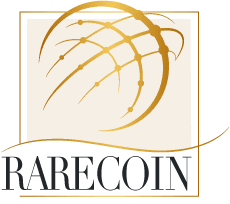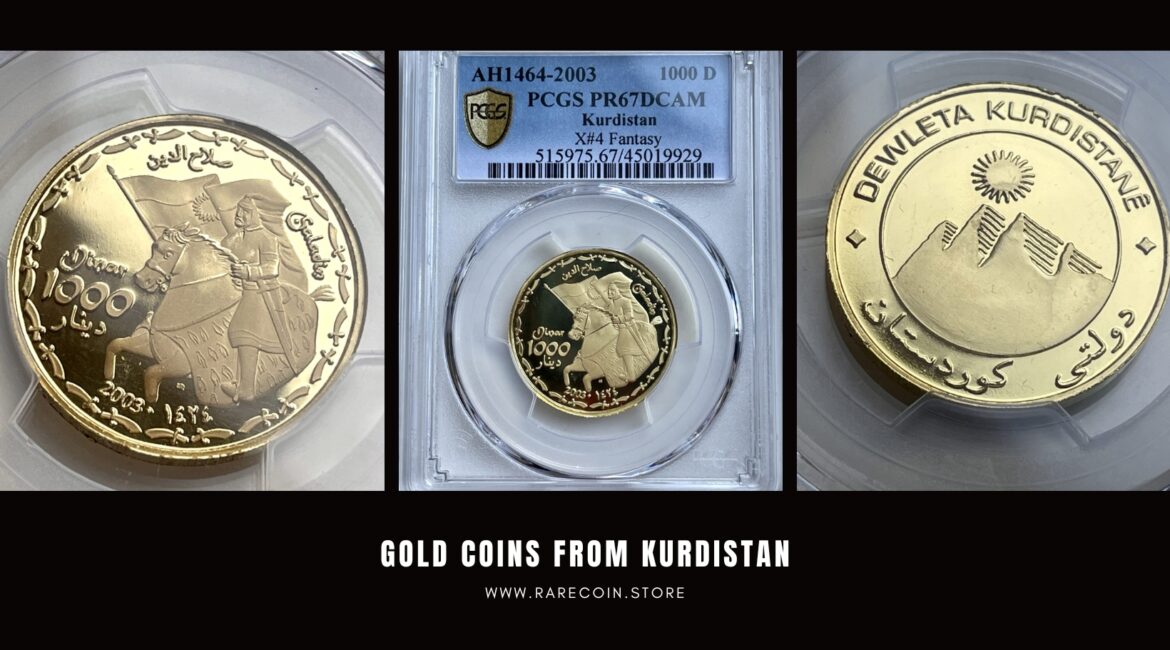Kurdistan, a region with a rich cultural heritage and a long history, has also been associated with the production of gold coins. These gold coins from Kurdistan have not only economic value, but also cultural and historical significance.
Kurdistan, an undefined region in the Middle East, is considered the historical homeland of the Kurdish people. The area covers parts of Turkey, Iraq, Iran and Syria. Within this diverse region, various local entities and authorities have issued their own gold coins, reflecting their unique identity and heritage. The gold coins of Kurdistan feature exquisite craftsmanship and intricate designs, often inspired by the rich cultural motifs and symbols of the region. These coins are a testament to the artistry and skill of the Kurdish people and reflect the essence of their traditions and beliefs.
Historically, gold coins from Kurdistan were minted to commemorate important events, honor significant individuals, or celebrate cultural milestones. They serve as a tangible reminder of the region’s history, heritage and struggles. These coins have become sought-after collectibles by numismatists and enthusiasts worldwide. In addition to their aesthetic appeal, the gold coins of Kurdistan also have economic value. They serve as a medium of exchange and for storing wealth. In the regions where they are accepted, these coins facilitate trade, contributing to the economic growth and development of Kurdistan.
The gold coins of Kurdistan are not only valuable in the region, but also attract the attention and interest of collectors and investors worldwide. Their rarity, historical significance and artistic appeal make them highly sought after in the numismatic market.
As Kurdistan continues to develop and assert its cultural identity, the production and circulation of gold coins remains an important aspect of its cultural and economic landscape. These coins are a testament to the rich heritage and enduring resilience of the Kurdish people, showcasing their unique traditions and contributing to the numismatic heritage of the region.
Some interesting facts about Kurdistan
Kurdistan is an undefined region in the Middle East that is considered the historical homeland of the Kurds. The exact borders of Kurdistan are not precisely defined, and some of the countries in this region avoid using the term or even ban it. However, the Kurdish population strongly supports and demands the use of the term. Depending on the definition, the total Kurdish settlement area covers about 440,000 to 530,000 square kilometers and stretches across Turkey, Iraq, Iran, and Syria.
Which festivals are particularly well known in Kurdistan?
Newroz is the most important festival in Kurdish culture and includes a variety of celebrations. It serves as a time for joyful activities such as games, dances, family gatherings, preparing special dishes, and reciting poems. Newroz festival is celebrated in different regions of Kurdistan with different local customs and traditions.
What does Kurdish cuisine look like?
Kurdish cuisine is a rich and diverse culinary tradition that reflects the unique culture and heritage of the Kurdish people. Known for its vibrant flavors and hearty dishes, Kurdish cuisine is a treat for the senses.
A staple of Kurdish cuisine is bread, which is often baked fresh and served with every meal. It is usually enjoyed with a variety of appetizers and mezes that showcase the region’s rich produce. These include dishes such as dolma (stuffed vegetables), hummus, baba ghanoush (fried eggplant dip) and various salads.
Meat occupies an important place in Kurdish cuisine, with lamb and chicken being very popular. Grilled kebabs, such as Seekh Kebab and Shish Kebab, are commonly eaten. Slow-cooked stews, known as khoresht, are also common and feature tender cuts of meat braised with an array of vegetables and aromatic spices.
Rice plays an important role in Kurdish cuisine and is often served as a side dish or as the basis for pilaf, which is enhanced with herbs, spices and sometimes meat or vegetables. Aromatic rice dishes such as biryani and tahchin are also very popular.
Vegetables and legumes are common in Kurdish cuisine due to the abundance of fresh produce in the region.One popular dish is fasuliya, a savory stew of green beans, tomatoes, onions and spices. Lentil soup and various bean dishes are also popular.
Dairy products hold a special place in Kurdish cuisine, and yogurt is a common accompaniment to many dishes. Ayran, a refreshing yogurt-based drink, is a popular way to quench thirst. In addition, Kurdish cuisine features a variety of cheeses, with white brine cheese, known as beyaz peynir, being very popular.
For those with a sweet tooth, Kurdish desserts offer a range of treats.Baklava, a pastry filled with nuts and sweet syrup, is enjoyed on special occasions. Other desserts include künefe, a cheese-based pastry drenched in sweet syrup, and shekliyeh, a semolina-based dessert flavored with cardamom and rose water.
Overall, Kurdish cuisine is characterized by a harmonious blend of flavors, spices and ingredients that create a delicious culinary experience. Whether you enjoy the succulent meat dishes, indulge in the aromatic rice or delight in the numerous appetizers and desserts, Kurdish cuisine is sure to give you a taste of the rich Kurdish heritage.
Who was Saladin (Salah al-Din Yusuf ibn Ayub, 1138-1193)?
Saladin, who was born in Tikrit, Iraq, in 1138 and died in Damascus in 1193, was of Kurdish descent. He served as a lieutenant under Nur al-Din, the governor of Aleppo, who deeply impressed him with his devotion to the Holy War. Driven by a fervent desire to reunite the Muslim empire, Saladin conquered Egypt, where he founded the Ayyubid dynasty by overthrowing the Fatimid caliphate. The Ayyubids held power in Syria, the Hijas, and Mesopotamia (1171-1250), where they founded numerous Sunni educational institutions. Most notably, Saladin’s victory over the Crusaders at Hattin near Lake Tiberius in Palestine on July 4, 1187, led to the capture of Jerusalem and eventually triggered the Third Christian Crusade (1188-1192). Saladin, whose image you see on the gold coin below, is a revered figure in the Arab world who stands for unity and independence.
Our favorite coin from Kurdistan
Kurdistan – 1000 Dinar – Saladin – PCGS PF67 Deep Cameo
One side of the coin depicts Salah al-Din Yusuf, known as Saladin, a revered Kurdish leader and sultan of the Ayyubid dynasty. He ruled over much of the Middle East from 1169 to 1193 AD and is known for his successful efforts to expel the European Crusaders from the Holy Land. The picture shows him on horseback with the modern Kurdish flag in the background.
Given the important role of mountains in Kurdish folklore, the other side of the coin shows four mountain peaks symbolizing the four nations with the largest Kurdish population. Above the mountains is depicted a rising sun with 21 rays, which is a traditional Kurdish symbol from before the nation’s conversion to Islam.
Mint: The Patrick Mint / The Patrick Mint
Do you want to add a touch of uniqueness and cultural significance to your collection? Then look no further! We are your trusted source for exquisite gold coins from Kurdistan.
Our collection includes a wide range of carefully crafted gold coins that embody the rich heritage and traditions of Kurdistan. Each coin tells a story and captures the essence of this historic region and its proud people. From commemorative coins celebrating significant events to coins featuring iconic symbols and figures, our selection will capture both your eyes and your imagination.
If you decide to buy gold coins from Kurdistan through us, you can be sure of their authenticity and quality. We work directly with reputable sources and knowledgeable experts to bring you genuine coins that meet the highest standards. Our commitment to authenticity ensures that you can build a collection that reflects the true spirit of Kurdistan.
These coins are not only a testimony of the rich cultural heritage of Kurdistan, but also have an economic value. Gold has long been recognized as a stable and valuable investment, and our carefully selected coins allow you to combine your passion for collecting with a wise financial decision.
Whether you are a gold coin collector, an investor, or simply someone who appreciates the beauty and cultural significance of gold coins, we invite you to explore our impressive collection.
Our team of experts will be happy to help you find the perfect piece to match your interests and preferences.
Don’t miss the opportunity to own a piece of Kurdish history and culture. Contact us today and inquire about our available Kurdistan gold coins. Our dedicated team will guide you through the buying process and provide you with all the information you need. Start your journey to owning a truly exceptional gold coin from Kurdistan with us.
Discover the new additions to our gold coin collection in the current range!
-
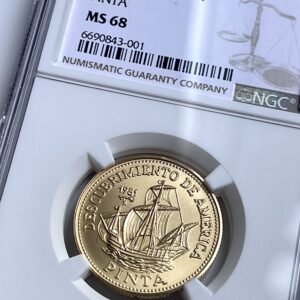
Cuba – 1981 – 100 Pesos – Pinta – NGC MS68
1.400,00 €plus shippingDelivery Time: approx. 2-3 days (excluding Saturdays, Sundays and public holidays) -
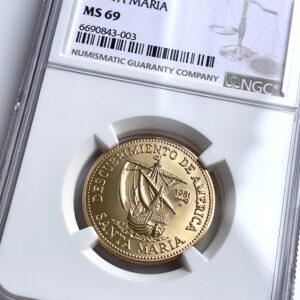
Cuba – 1981 – 100 Pesos – Santa Maria – NGC MS69
1.400,00 €plus shippingDelivery Time: approx. 2-3 days (excluding Saturdays, Sundays and public holidays) -
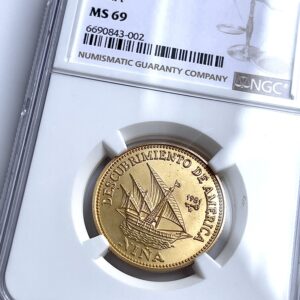
Cuba – 1981 – 100 Pesos – Nina – NGC MS69
1.400,00 €plus shippingDelivery Time: approx. 2-3 days (excluding Saturdays, Sundays and public holidays) -
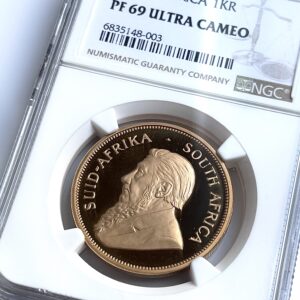
Krugerrand – 1993 – 1 oz Proof Gold Coin – NGC PF69 Ultra Cameo
3.300,00 €plus shippingDelivery Time: approx. 2-3 days (excluding Saturdays, Sundays and public holidays) -
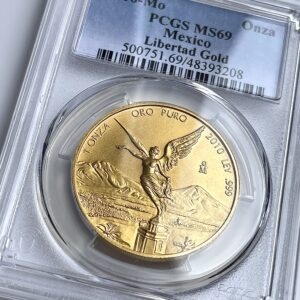
Mexico – 2010 – Libertad – Gold coin 1 oz – PCGS MS69
3.150,00 €plus shippingDelivery Time: approx. 2-3 days (excluding Saturdays, Sundays and public holidays) -
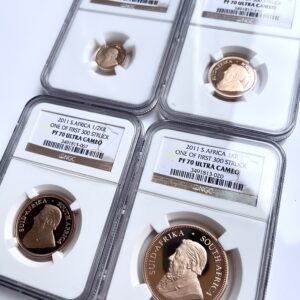
Krugerrand – 2011 – Set – One of First 300 – 4 Gold Coins Proof – NGC PF70 UCAM
5.500,00 €plus shippingDelivery Time: approx. 2-3 days (excluding Saturdays, Sundays and public holidays) -
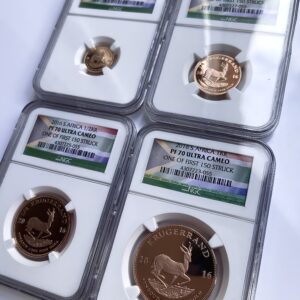
Krugerrand – 2016 – Set – One of First 150 – 4 Gold Coins Proof – NGC PF70 UCAM
5.500,00 €plus shippingDelivery Time: approx. 2-3 days (excluding Saturdays, Sundays and public holidays) -
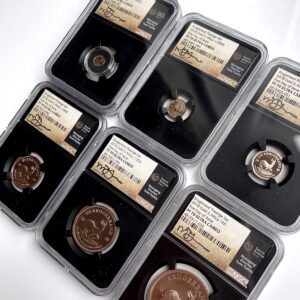
Krugerrand – 2018 – Set – First Day of Issue – 6 Gold Coins Proof – NGC PF70 UCAM
5.750,00 €plus shippingDelivery Time: approx. 2-3 days (excluding Saturdays, Sundays and public holidays) -
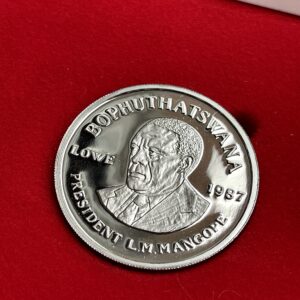
Bophuthatswana – 1987 – 10 years of independence – platinum – 1oz – with original case and certificate
2.195,00 €plus shippingDelivery Time: approx. 2-3 days (excluding Saturdays, Sundays and public holidays) -
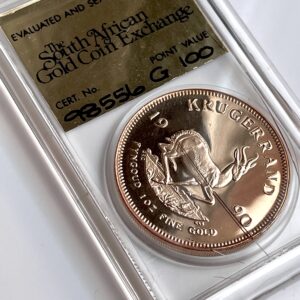
South Africa – Krugerrand – GRC – 1990 – SAGCE PoV 100 – 1oz Proof Gold
3.250,00 €plus shippingDelivery Time: approx. 2-3 days (excluding Saturdays, Sundays and public holidays)
